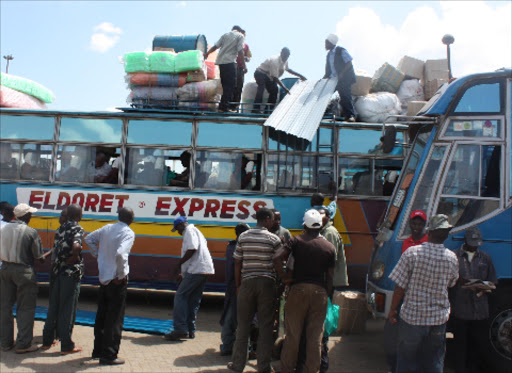John Matu, a sales representative with a local media house in Nairobi is ready to take a 30 per cent pay cut for a similar role in his native Meru County.
The 43 year old told the Star that his Sh90,000 monthly salary is not sustainable in the city where rent, transport and food gobbles close to 70 per cent.
“Life in the city is tough. Everything here is money. I struggle to spare Sh10,000 for my Sacco contribution. It is a horrible hand to mouth scenario that I can’t wish even on my worst enemy,” Matu says.
“My village mates working in counties are doing better in life with half mu pay. I can’t wait for an opportunity to relocate to a rural setting even if it means taking a 30 per cent pay cut.”
His sentiments are echoed by Emmanuel Milimu who is hoping for an upcountry transfer.
“I have nothing to show for my Sh150,000 gross salary here in the city. My take home narrows to Sh90,000 with rent, school fees, transport and food taking the balance. It is extremely demotivating.”
According to him, Sh60,000 in rural settings is good enough. I’ll spend less on food, zero on rent, less on transport. “Social amenities like schools are quite affordable too.”
There concerns reflet wishes of thousands of employees in cities who are pinched by the high cost of living, with the majority forced to borrow to meet basic needs despite hefty salaries.
A year end poll by TIFA dubbed ‘Kenyan’ reflection of 2023′ shows most employees in Nairobi, Kisumu and Mombasa are willing to take a 20 per cent pay cut to relocate to their native counties as the living cost becomes unbearable.
The poll reveals that the cost of living is four times higher in cities than in rural areas, a move that has triggered a reverse migration pattern in the country.
Before 2010, when Kenya promulgated its constitution that introduced devolved units, urban- rural migration was at 69 per cent.
This has since changed, with the rate of migration dropping to 39 per cent in 2022 according to the Kenya Institute for Public Policy Research and Analysis (KIPPRA).
The survey attributes this to the opening up of job opportunities in rural areas courtesy of county governments and digital evolution that has inspired remote working.
The survey by KIPPRA also touches on the cost of living, with a sharp focus on rent, food, transport, health and education.
It shows,the average rent for a one -bedroom house in Nairobi averages Sh15,000, Sh13,000 in Mombasa and Sh12,500 in Kisumu.
This is almost double compared to smaller towns like Sh8,500 in Kitale, Sh7,500 in Nyeri, Sh7,000 in Machakos and Sh6,500 in Siaya.
The study shows that food takes a third of net salary in Nairobi, almost a quarter in Mombasa and slightly less than a third in Kisumu.
This is far much more compared to an employee earning Sh40,000 in Eldoret, Meru, Kitui, Kisii and Vihiga. Food takes less than Sh5,000 per month in those remote towns.
A latest survey by Research Square dubbed ‘Urban-rural migration, Kenya devolution policy, income and occupational change’ shows that male employees are moving to rural areas more than their female counterparts.
Results found that 31 per cent of the male migrants were employed before migration compared to 12 per cent of females, which could be attributed to gender labour market disparities and economic investment patterns in Kenya urban settings.
In terms of specialisation the study reveals that a majority of the males were working in the civil service, education and research while females were largely working in the cottage industry.
For the 76 per cent of study participants, household income ranged between Sh15, 500 and Sh50, 600.
Before migration, the incomes ranged between Sh17, 100 and Sh53, 100.
“This demonstrates that employed people have a lower likelihood of returning to the rural homes but most importantly, more employed males are likely to migrate home than their female counterparts.
A higher average income before migration than after the migration also suggests that the average earnings might not be the key motivation to move away from cities.
Those working as civil servants and aged between 35-50 years experienced a significant increase in income after the migration. Previously, their incomes were slightly lower than Sh45,000. After migration, the income was about Sh51,000.
Migrants in the manufacturing sector, the income before migration was Sh40,000. This income rose to about Sh48, 000 after migration. A similar trend was experienced among people who were small business owners.
Ordinarily, people are likely to migrate to areas where there are increasingly lucrative economic opportunities and more income. Civil servants would relocate to their rural areas to assume new roles after job promotions.
However, in this research, there is a decline in the average income of some of the respondents, which indicates the presence of other incentives for return migration other than the collectively accepted economic opportunities.
Further, the research tested the probability of income increase after going back home based on the economic and demographic attributes. From table 3-5, the probability of people aged above 40 experiencing an increase in income was 42.1 per cent.
The corresponding probability for postgraduate degree holder’s and possessing more than 2.5 acres of land was 59.1 per cent and 47.3 per cent respectively.
Gender (being female) had a negative impact of 12.3 per cent on the possibility of experiencing increase in income after going back home.
The probability of earning more for the migrants who were in self-employment before returning home was 10.2 per cent while that for those who were initially working in the civil service was 22 per cent.
Migrants who left the city to pick up public service jobs in the rural areas, had an average of 22 per cent probability of increase in income.











